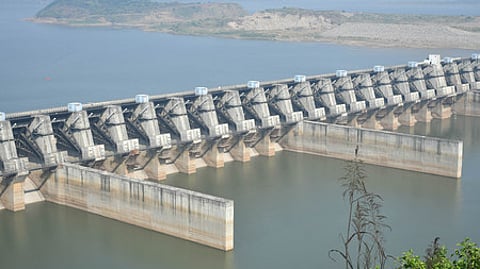

VIJAYAWADA: The Central Environment Expert Appraisal Committee (EAC) for River Valley and Hydroelectric Projects has declined approval for Andhra Pradesh’s Polavaram-Banakacherla Link Project (PBLP), citing legal and environmental issues.
The decision was taken after its 33rd meeting on June 17, 2025. and communicated to the State on Monday (June 30).
The committee has returned the PBLP proposal to Andhra Pradesh for clarification, underscoring the need for compliance with tribunal rulings and interstate agreements.
Chaired by G K Chakrapani, the EAC emphasized that any clearance would require a review of the 1980 Godavari Water Disputes Tribunal (GWDT) verdict and consultations with the Central Water Commission (CWC).
Sources told TNIE that the water resources department is discussing the issue at length and would respond at the earliest.
It should be noted here that in his recent media conference, Minister for Water Resources Nimmala Ramanaidu expressed confidence that PBLP would get the nod for environmental clearance.
The PBLP, proposed by Andhra Pradesh’s Water Resource Department, sought Terms of Reference (TOR) for a 376-km canal system to transfer 200 TMC of floodwater from Polavaram Dam to Banakacherla Regulator across eight districts: East Godavari, West Godavari, Eluru, Krishna, NTR, Palnadu, Prakasam, and Nandyal.
Resolve interstate disputes via CWC: EAC to govt
Costing Rs 81,900 crore, the project aims to irrigate 3 lakh hectares, stabilize 9.14 lakh hectares, provide drinking water to 80 lakh people, and supply 20 TMC for industrial use.
It includes two 200 MW hydropower stations, a 19.5 km tunnel through the Nagarjuna Sagar-Srisailam Tiger Reserve, 17.28 km of pipelines, and 9 pumphouses, requiring 24,064 hectares, including 1,717 hectares of forest land.
During the virtual meeting on June 17, the EAC reviewed objections from Odisha and Chhattisgarh, highlighting potential flooding and GWDT violations. The panel recommended a comprehensive floodwater assessment and urged Andhra Pradesh to resolve interstate disputes through the CWC, alongside addressing environmental impact assessments (EIA) and TOR requirements.
The EAC also drew on the updated Cumulative Impact Assessment and Carrying Capacity Study (CIA&CCS) for the Yamuna River Basin, presented by ICFRE on July 18-19, 2024.
The study’s robust data on river cross-sections, biodiversity, and environmental flows set a benchmark for evaluating projects like PBLP, particularly concerning the tiger reserve tunnel, which requires further scrutiny to ensure minimal ecological impact.